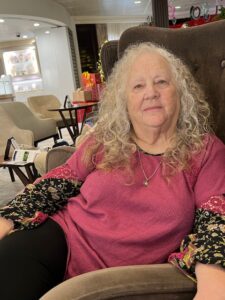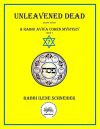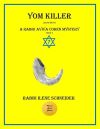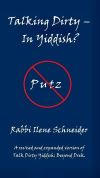By Donald H. Harrison


AT SEA, Aboard Azamara Onward – Preferring to work at her laptop in places where people provide the background noise, Rabbi Ilene Schneider often may be found sitting quietly in one of this cruise ship’s lounges pecking away at her fourth mystery novel.
Three previously published novels with punny titles all are set around Jewish holidays. Their protagonist is Rabbi Aviva Cohen, who in some respects, according to Schneider, resembles her: the fictional Cohen is “a woman rabbi from south New Jersey, and she is short, chubby with unruly curly red hair.”
On the other hand, there are differences. Schneider is married and the parent of two sons with Rabbi Emeritus Gary Gans of Congregation Beth Tikvah in Marlton, New Jersey. The fictional Rabbi Cohen is single and childless after being twice divorced. The fictional Cohen is a pulpit rabbi; Schneider spent most of her rabbinate in the field of education.
 In Schneider’s first mystery novel, Chanukah Guilt, after an unpopular land developer dies of a heart attack, his daughter, a college student, tells Rabbi Cohen at the shiva that she feels responsible for her father’s death. Soon afterwards the daughter is found to have committed suicide – or was she murdered?
In Schneider’s first mystery novel, Chanukah Guilt, after an unpopular land developer dies of a heart attack, his daughter, a college student, tells Rabbi Cohen at the shiva that she feels responsible for her father’s death. Soon afterwards the daughter is found to have committed suicide – or was she murdered?
 In the second novel, Unleavened Dead, which takes place during Pesach, Cohen learns that Sherry, the partner of her niece, Trudy, is being investigated for the hit-and-run death of her former boss, who forced her from her university job as a psychological therapist. It looks bad for Sherry, because there is a body-size dent on her car. Rabbi Cohen, knowing that Sherry is not the type of person who would either murder or leave the scene of an accident, investigates.
In the second novel, Unleavened Dead, which takes place during Pesach, Cohen learns that Sherry, the partner of her niece, Trudy, is being investigated for the hit-and-run death of her former boss, who forced her from her university job as a psychological therapist. It looks bad for Sherry, because there is a body-size dent on her car. Rabbi Cohen, knowing that Sherry is not the type of person who would either murder or leave the scene of an accident, investigates.
 In the third novel, Yom Killer, which takes place around Yom Kippur, Rabbi Cohen receives a phone call from a nephew in Boston, where his grandmother – Aviva’ Cohen’s mother – is in the hospital after having been found unconscious in her assisted living residence. She has a telltale bruise on the front of her head from her fall, but there is a mysterious bruise on the back of her head as well, which could not have been associated with the fall. Quite naturally, Rabbi Cohen investigates.
In the third novel, Yom Killer, which takes place around Yom Kippur, Rabbi Cohen receives a phone call from a nephew in Boston, where his grandmother – Aviva’ Cohen’s mother – is in the hospital after having been found unconscious in her assisted living residence. She has a telltale bruise on the front of her head from her fall, but there is a mysterious bruise on the back of her head as well, which could not have been associated with the fall. Quite naturally, Rabbi Cohen investigates.
The fourth novel, now in progress, will be titled Killah Megillah, which takes place around Purim. In an abandoned synagogue, a deconstruction crew finds a large trunk with Jewish books. They call Rabbi Cohen to see if she wants the books for her synagogue library. Going through the large trunk, Rabbi Cohen is shocked to find human bones. Whose are they and how they got there are her immediate questions.
Rabbi Schneider says her novels belong to the sub-genre of “cozy mysteries,” which eschew graphic descriptions of sex and violence. Her protagonist is very intuitive and though she blends in at social functions, her ears are sharp for other conversations that may provide clues.
During a day at sea in Azamara Onward’s transcanal voyage from Miami to San Diego, I asked Schneider how she came to be a rabbi and a mystery writer.
She answered that at Simmons College in her hometown of Boston, she had majored in journalism and some of her stories were published by the Boston Herald-Traveler. However, in 1970 when she graduated, most female journalists were assigned to writing obituaries or reports about social activities, and “I didn’t want to do that.”
She had read and admired Judaism as a Civilization by Rabbi Mordecai Kaplan, the father of the Reconstructionist branch of Judaism. At a Shabbat dinner, she learned that the Reconstructionist Rabbinical College (RRC) in Philadelphia had been open for a year. An RRC information session was being held on the campus of Brandeis University, which is located near Boston. She asked a recruiter there whether there was any reason that a woman could not study for the rabbinate at the Reconstructionist Rabbinical College. When told that women were indeed eligible for ordination, she decided to enroll. To prepare, she spent a year in Israel, improving her Hebrew.
The formal five-year study program lasted from 1971 through her ordination in 1976. She married Gans, a slightly younger man who was three years behind her at the RRC, two weeks after her ordination. She was among the first three female Reconstructionist rabbis in the United States. Then she began looking for jobs, and they didn’t come easily. She worked as the principal of a supplemental community high school. When she applied to become the education director of a Conservative congregation, “the rabbi sent me a letter saying that we would accept you as an education director, but you can never use your title as rabbi, and you cannot have any pulpit duties.” That rabbi, who leaned toward Orthodoxy, said it was a board policy, not his, “but it was him,” Schneider said.
Eventually, she found a position with the Jewish Federation in the Atlantic City, New Jersey, area as director of Jewish education. “I did all the community programming—Yom Hashoah, Yom Ha’atzma’ut” and they also had a community Jewish high school. However, a three-hour round-trip commute was difficult, especially with a young child at home. She left that position and then completed a doctorate in education at Temple University. Her dissertation topic surveyed the issues surrounding a community Jewish high school. Should it be initiated by a Federation, or by local synagogues? Should wearing kippot be required? Should there be separate or co-ed classes for boys and girls?
After earning her degree, she went to work for a college that offered master’s degrees for teachers. She worked there several years until a superior tried to downgrade her position and force her out. She said she sued and the case went to arbitration, with Schneider winning a year’s severance pay.
 For the next 7 1/2 years, she ran a Jewish hospice program until she retired and then wrote some non-fiction articles and books, including Talking Dirty — in Yiddish, which may have been mistitled by the company that contracted with her. Yes, the book included naughty Yiddish words, but it also dealt with the development of the Yiddish language and with some rich Yiddish curses.
For the next 7 1/2 years, she ran a Jewish hospice program until she retired and then wrote some non-fiction articles and books, including Talking Dirty — in Yiddish, which may have been mistitled by the company that contracted with her. Yes, the book included naughty Yiddish words, but it also dealt with the development of the Yiddish language and with some rich Yiddish curses.
An inveterate reader, she loved analyzing mysteries and often attended conferences for mystery writers. The success of Chanukah Guilt was so encouraging, she kept at the craft.
*
Donald H. Harrison is publisher and editor of San Diego Jewish World.
Loved reading all this about Ilene’s life. She’s always been a wonderful person to know.
I enjoyed learning more about Ilene’s backstory. The books are great reads, funny and fun!